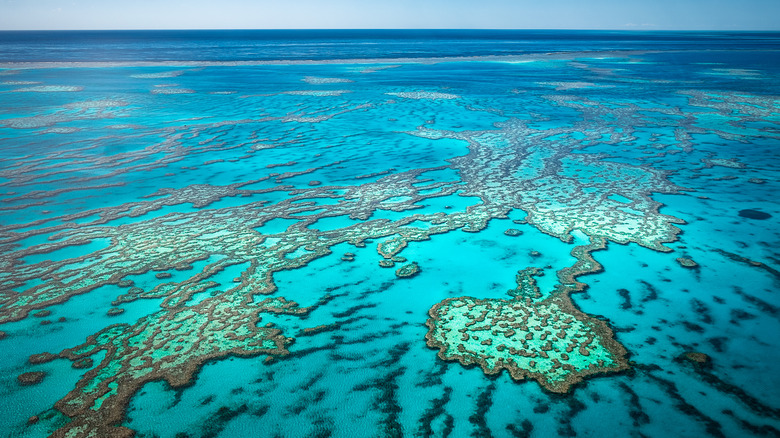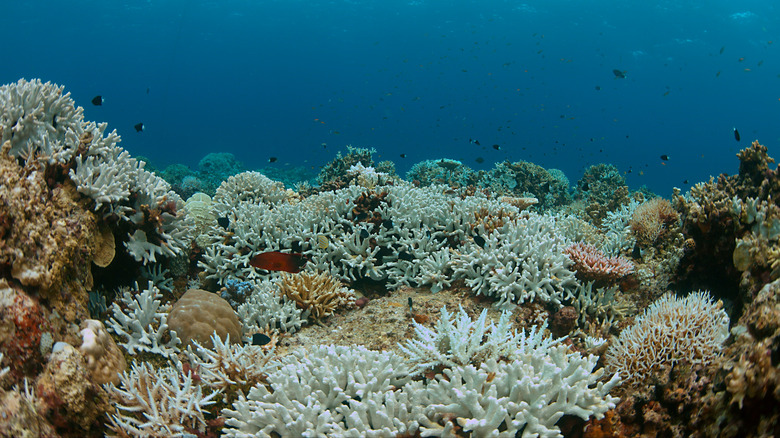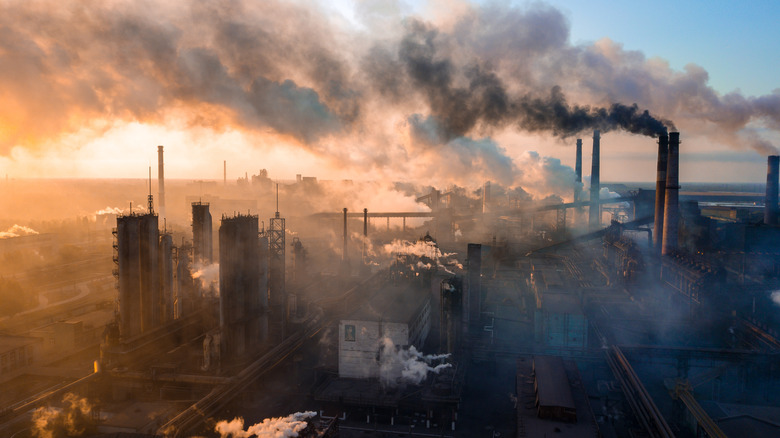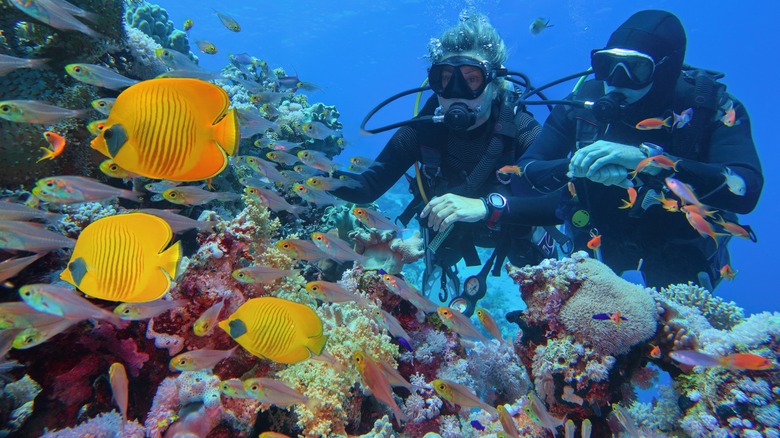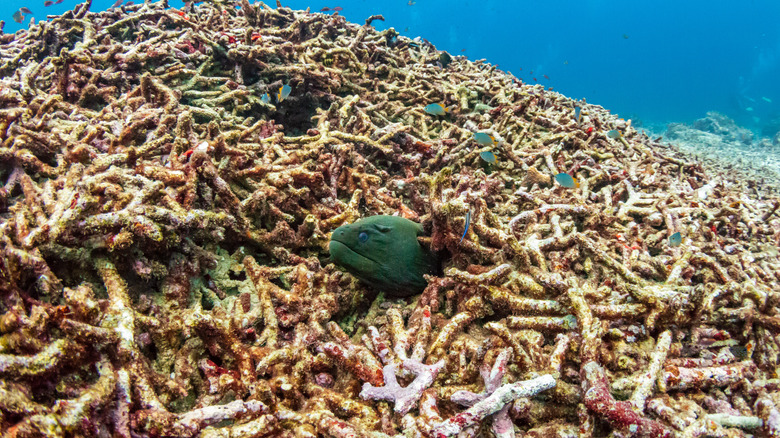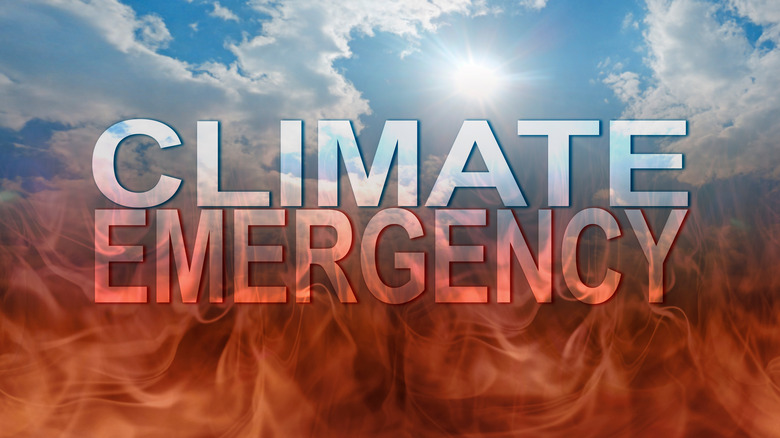The Terrifying Percentage Of The Great Barrier Reef That We've Lost In The Last Two Decades
Nature has always provided us with beautifully breathtaking wonders, from the United States Grand Canyon to Victoria Falls in Africa. However, one of nature's most astounding works lies in the Coral Sea off the coast of Queensland, Australia. At over 1,500 miles in length and visible even from space, the Great Barrier Reef is truly remarkable.
Underneath the ocean's surface lies the vibrant colors and life of the reef, and for years, researchers and admirers have studied the beauty and life around and within it. While the sheer size of the reef makes it seem as if no force could harm it, it's now facing some of the harshest conditions it has ever had to survive, and humankind is to blame. In the last two decades alone, the impact humans have made on the Great Barrier Reef has been devastating and almost unbelievable. In fact, for those who haven't been keeping up on the state of the reef, the truth might be surprising.
Mass coral bleaching events are becoming a major concern
When the coral that makes up the Great Barrier Reef gets too stressed out by the state of the waters around them, an event known as coral bleaching takes place. The process of bleaching begins when the waters around the coral become too warm, and the sea animal becomes stressed. When the coral is stressed, they will turn out the algae living in their tissues and, in turn, become completely white, per the National Ocean Service.
The first mass bleaching event took place in 1998, and in 2022, the sixth mass bleaching event took place, despite having a year of La Niña, a time when more rain and cooler temperatures typically would provide some relief for the corals. After the bleaching event in 2022, government scientists surveyed the Great Barrier Reef by aircraft and assessed that severe bleaching had affected 60% of the corals in the reef, according to The New York Times.
Humans are to blame for the destruction of the reef
When a coral bleaching event takes place, the coral isn't dead and can recover if the temperatures in the water around them cool down for a long enough time period. However, because of human implemented destruction caused by behaviors like burning fossil fuels and deforestation, the planet has been getting hotter at alarming rates, and the ocean has continuously been taking 90% of the heat off of the rest of the planet and absorbing around one-third of the carbon dioxide emitted from human activity, according to The Guardian. This destruction causes the ocean to acidify and the coral reefs to degrade and eventually die under the mayhem.
Since the 1990s, the coral in the Great Barrier Reef has rapidly declined by more than 50%, as reported by ScienceAlert. There are around 900 known species of coral, some of which have a higher tolerance to heat than others. However, these species typically aren't as rich in biodiversity as their counterparts and grow at a much slower rate. The Chairman of the Coral Specialist Group for the International Union for Conservation of Nature, David Obura, spoke to the urgency of the situation when he said, "Coral reefs are the canary in the coal mind telling us how quickly it can go wrong," per The New York Times.
The Great Barrier Reef does plenty to improve the lives of humans
With the declining state of the Great Barrier Reef comes not only the loss of one of Earth's most precious works of art but also an immense impact on the way millions of humans live their lives. Coral reefs benefit humans in a large way by supporting the livelihoods of many by bringing in billions of dollars worth of tourism, protecting the shores from harsh storms with their limestone branches, and since they are the home of a quarter of the world's marine life, they provide food to millions of people every day, according to The Guardian.
The destruction of climate change wreaking havoc on the Great Barrier Reef threatens to cause harm to the livelihoods of so many who depend on it. Though protecting the reef might seem like the obvious answer to the problem, it has been made more complicated than that, and not everyone seems to be on board with the necessary steps to do so.
Securing protection for the reef has been challenging
According to The New York Times, the Australian government isn't proactive on the climate crisis and its effects on the reef as there has been little done over the years in terms of protecting the reef from harm. Instead, the Australian government has pushed to keep the reef from being placed on a list of endangered World Heritage Sites. Rather than find ways to cut emissions, they've instead tried different paths, like killing invasive species, cleaning up agricultural run-off, and encouraging the growth of coral species that can tolerate higher temperatures.
Most recently, however, steps have been taken to protect this oceanic wonder and all it has to offer, as Environment Minister Tanya Plibersek moves to prevent the development of the Central Queensland Coal Project, per Courthouse News. The coal mine would have been set to open just northwest of Rockhampton and could have a negative impact on the reef.
Past damage can't be undone but further damage can be prevented
The damage humans have caused with destructive behaviors, and lack of action regarding the health and preservation of nature that supplies so many resources is undeniable and rapidly getting out of hand. Marine life is taking the fall for the actions of humans, and the outcome is devastating.
The rising temperatures of our oceans are causing a growing risk of devastation and loss within oceanic ecosystems, according to the World Meteorological Organization, and the Great Barrier Reef is just one of these ecosystems being affected. The recent decline in marine life in coral reefs is so rapid that between 2009 and 2014, 14% of the world's coral reefs were lost, per The New York Times.
While the damage that's already been done can't be erased, further damage to the Great Barrier Reef can be prevented if humans allow it. Without action, one of the greatest wonders on the planet, full of life and resources, will be lost entirely.
